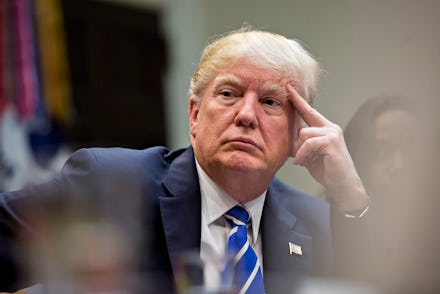The biggest threat to Trump's promise of job creation might just be Senate Republicans

WASHINGTON, D.C. — Fresh off a defeat over health care, President Donald Trump has pivoted to tax reform. And once again, the president finds himself weighing the difficult choice between passing a successful bill or keeping a campaign promise to his supporters — one that could kill tax reform in the Senate.
The latest obstacle? Taxing imports manufactured outside the United States. The president and House Speaker Paul Ryan are exploring a plan to tax goods imported into the U.S. But on Monday, key Senate Republicans said they would not support Ryan's "border adjustment tax." A top Republican said in an interview that he would not support a tax reform package that included such a tax.
Ryan's plan would impose a 20% tax on goods imported into the U.S. and raise a projected $1 trillion over 10 years. Ryan and the White House believe this will incentivize companies to create manufacturing jobs in the United States. What's more, the money raised by a border tax would also cover the cost of corporate tax cuts, a cornerstone of Republican tax reform proposals.
The border tax, though, is not universally accepted among the Republican Party, which has traditionally supported free trade. Five GOP senators interviewed for this story gave the border tax proposal a lukewarm review; three of them rejected it outright. So Trump's efforts at tax reform may meet the same fate that befell his push to repeal and replace the Affordable Care Act — a policy that could not get through the legislature because Republicans themselves were divided on its particulars.
When asked Monday whether he would support a tax reform bill that included a tax on imports, Texas Sen. John Cornyn simply said, "No."
"That border adjustment part is based on assumptions I'm not sure are true," Cornyn said.
The senator's comment came after Reince Priebus said Sunday the president will proceed with the border tax proposal. "He's not backing off of that," Trump's chief of staff said on Fox News.
A campaign promise
Taxing imports was a core campaign promise for Trump, who told blue-collar workers in Michigan, Ohio, Pennsylvania and Wisconsin he would tax companies that do not produce goods in the U.S. The president flipped working class Democratic counties to his side by touting his message of economic nationalism.
In December, Trump promised to impose a 35% tax on goods sold in the U.S. by companies that relocate manufacturing from the United States to another country. Ryan's plan would tax imports by 20% across the board, favoring American exporters and manufacturers.
Trump has long suggested versions of a tax on imports to level the playing field for American companies. By penalizing overseas manufacturers, the U.S. can give domestically manufactured products a leg up, the thinking goes. But the immediate impact of a 20% tax at the border could increase the cost of retail goods nationwide. And it may not be a large enough incentive to drive factory growth in the U.S.
Those ideas are non-starters in the Senate.
Sen. Ron Johnson (R-Wisc.) said he does not support the tax, a promise the president made to voters in Johnson's home state where Trump won by fewer than 23,000 votes. "I don't think the border adjustment tax has a chance of passage," Johnson, a former manufacturing executive, said in an interview.
Cornyn, the Senate's number two Republican, and Johnson, a Senate Budget Committee member, are notable additions to a group of Republicans who do not support the tax. Sens. John McCain (R-Ariz.), Jeff Flake (R-Ariz.), Lindsey Graham (R-S.C.), Tom Cotton (R-Ark.) and David Perdue (R-Ga.) have also come out against it. With the GOP's four-seat Senate majority, that is more than enough Republicans to kill the border tax.
Canada and Mexico, two of America's three largest trading partners, are opposed to the proposal that clashes with the North American Free Trade Agreement. Mexico alone ships 80% of its exports to the U.S., while Canada or Mexico are the first or second largest export market for 30 states.
Key to overall tax reform
Republicans will likely employ reconciliation to pursue tax reform. That means they can pass a bill with 50 votes in the Senate, but only if a bill does not send the federal government further into debt. Health care reform would have cut hundreds of billions of dollars from the federal deficit. Without those savings, Republicans need revenue from the border tax to keep tax cuts for corporations from increasing the federal debt.
A spokesperson for Ryan did not return a request for comment Monday on the Republican timeline for rolling out tax reform, which Trump said would happen in his first 100 days.
Bundling the border tax in a larger tax reform bill could doom the legislation, just as eliminating essential health benefits alienated moderate Republicans from the American Health Care Act. That would send Republicans back to square one.
"Personally, I have real questions about [the tax]," Sen. Orrin Hatch said in an interview. The Utah senator and chairman of the Senate Finance Committee said he was concerned about increases in price Americans might see on retail goods.
Even before it reaches the Senate, the border tax has no guarantee of passing the House. Conservative House Republicans could oppose the premise of any tax increase, limiting the bill's chances of passing the House.
Not all Republican senators said the border tax would kill tax reform. John Barrasso, a member of Senate Republican leadership, said in an interview that there is broad agreement among the GOP about tax reform, with the border tax as the sticking point. "That's the area of debate, discussion," Barrasso said.
March 28, 2017, 12:40 p.m.: This story has been updated.